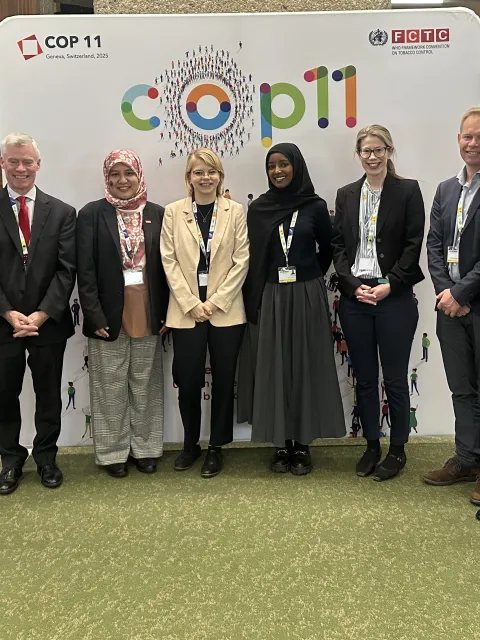UICC to advance lung cancer resolution at the World Health Assembly
UICC is supporting a new resolution on integrated lung health at the upcoming World Health Assembly in May as part of broader efforts to address lung cancer through prevention, early detection, and improved access to care.

HIGHLIGHTS
- UICC is supporting a new resolution at the 77th World Health Assembly to advance integrated lung health policies globally.
- Co-sponsored by 14 Member States, the resolution calls for universal lung health services, stronger air quality standards, and improved access to screening, medicines, and diagnostics.
- Tobacco use and air pollution are identified as major risk factors, together accounting for most lung cancer deaths worldwide.
- The Lung Cancer Collaboration, led by UICC, seeks to double five-year survival rates by 2030 through coordinated efforts across prevention, detection, and treatment.
Lung cancer is the most commonly diagnosed cancer globally, with nearly 2.5 million new cases each year. It is also the leading cause of cancer death, responsible for 1.8 million deaths annually – more than the next two causes, colorectal and liver cancers, combined and nearly three times as much as breast cancer (Globocan 2022). Without urgent and coordinated global action, lung cancer deaths are projected to increase by 30% by 2035.
To address this situation, UICC is supporting a new resolution on lung health at the 77th World Health Assembly in Geneva this May, “Promoting and prioritising an integrated lung health approach,” focusing on those aspects particularly relevant for addressing lung cancer.
Co-sponsored by 14 Member States (Bangladesh, Brunei Darussalam, China, Egypt, Ghana, Guatemala, Japan, Kuwait, Malaysia, Palestine, Qatar, Romania, Thailand and Vanuatu), the resolution urges countries to adopt integrated national lung health policies, primary healthcare systems to provide universal access to lung health services, strengthen both indoor and outdoor air quality standards, reduce exposure to environmental and occupational risks and enforce health regulations, address stigma related to lung cancer and other lung diseases, as well as improve access to screening, essential medicines, vaccines, and diagnostics.
The resolution also calls on the WHO Director-General to assess existing strategies and gaps in lung health policies to identify areas for improvement, develop a framework for monitoring progress on global lung health initiatives with measurable targets, provide technical support to Member States for the implementation of integrated lung health programmes, and mobilise resources and collaborate with stakeholders to advance capacity building, research, and implementation.
“Lung cancer has historically received inadequate attention in national cancer control plans, with only 12% of plans including actionable screening strategies. This resolution is an opportunity to change that by recognising lung cancer as part of a broader commitment to integrated lung health.”
– Yannick Romero, Senior Manager of Knowledge, Advocacy and Policy at UICC – leading UICC’s work on lung cancer.
Integrated approaches to lung cancer care involve the full continuum – from prevention and early detection to treatment and survivorship.
While historically lung cancer has been very difficult to detect in its early stages due to the absence of noticeably symptoms, lung cancer is largely preventable. Tobacco consumption, second-hand smoke, outdoor and indoor air pollution, asbestos and radon exposure are leading causes of lung cancer.
Tobacco use remains the primary risk factor, linked to more than two-thirds of lung cancer deaths globally. Exposure to air pollution is estimated to contribute to about one-third of lung cancer mortality. Many of these risk factors overlap and can be mitigated through evidence-based policies promoting better health.
These factors not only increase lung cancer incidence but also compromise quality of life and treatment outcomes for people living with cancer. Poor air quality, for example, can worsen respiratory symptoms, increase hospitalisations, reduce lung function in individuals undergoing cancer treatment, and limit their ability to engage in even mild physical activity such as walking. This may complicate treatment, delay recovery, and lower tolerance to therapies.
With World No Tobacco Day on 31 May and World Environment Day on 5 June, there is renewed attention on reducing exposure to these two factors. Effective prevention strategies include strict tobacco control measures, including taxation, protecting youth from tobacco industry marketing, and smoke-free environments, improved air quality, more green spaces, and occupational safety standards.
Early detection is essential in reducing lung cancer mortality. However, symptoms are often absent or non-specific until the disease is advanced. Despite progress in low-dose CT screening for high-risk populations, only a minority of countries have included lung cancer screening in their National Cancer Control Plans. UICC and partners have supported research highlighting the potential of early detection strategies and the need to overcome implementation challenges, particularly in low-resource settings.
Treatment options have evolved in recent years, including targeted therapies, immunotherapies, and minimally invasive surgical techniques. These advances improve survival and quality of life but are most effective when the disease is detected early. Integrated lung health strategies must therefore prioritise access to timely diagnosis and treatment alongside prevention.
“The resolution is an important step toward a long-term, integrated approach to lung health, centred on prevention, equitable access and sustainability. It will allow governments to align on key priorities, tackle stigma, and increase access to services that save lives.”
– Cary Adams, CEO, UICC
To strengthen global coordination, the Lung Cancer Collaboration (LCC) was launched in 2021 and is led by UICC since 2023. The LCC aims to double the five-year survival rate of lung cancer by 2030 through global efforts focused on prevention, early detection, and treatment.
UICC member organisations such as the International Association for the Study of Lung Cancer (IASLC), Lung Connect India Foundation, Japan Lung Cancer Society, LUNGevity Foundation (USA) WALCE onlus (Women against lung cancer, Italy), and Respirando con Valor (Mexico), are further contributing to the global response, advancing research, public awareness, and the engagement of people with lived experience in a range of national and regional contexts.
UICC also works with partners through the International Cancer Control Partnership to ensure all countries have a well-resourced, quality national cancer control plan. Through this work, UICC emphasises the importance of including lung cancer in these plans.
To this end, the LCC is also contributing to the International Agency for Research on Cancer’s (IARC) Lung Cancer Screening Handbook, which will provide evidence-based recommendations to guide policy and implementation.
The IARC Lung Cancer Handbook and the upcoming integrated lung health resolution will help support the LCC's objective of doubling the 5-year survival rate in lung cancer by 2030.

Last update
Thursday 22 May 2025
